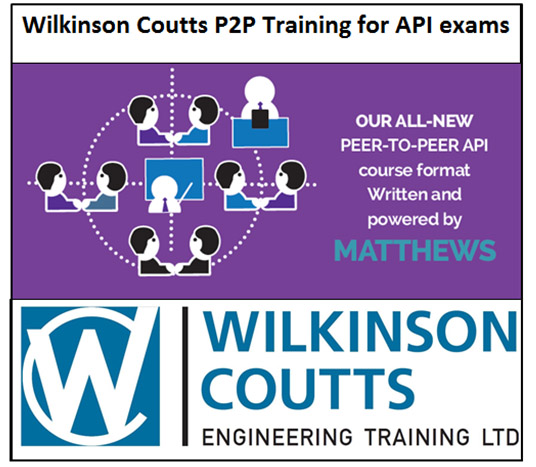UPSKILLING TRAINING TIPS:
From WILKINSON COUTTS ENGINEERING TRAINING LTD
‘UPSKILLING’: ‘The activity of teaching existing employees new skills’

Like so many things, the idea of individual employers in the integrity industry ‘upskilling’ their NDT and other technical specialist employees sounds like a good idea. It improves employees’ technical competence, fits with the image of themselves that companies like to promote and might even help with staff retention.
Like all good ideas that they have heard of, most employers, if you asked them, would claim to be doing them already. They would point to their employee training records, carefully matched to the requirements of accreditation bodies and the scope of their certificates proudly displayed on their walls. In the same breath however, they would mention the apparent downside; that better-trained employees are more likely to leave to take up better work for other employers elsewhere.
You can see the problem here
All employers face much the same dilemma; to train or not to train. Some consciously choose a solution at corporate level, and implement it, leaving others to do little more than respond reactively to the training requests of their employees. This is fine if you believe that employees are driven by the need to provide benefits for their employer, rather than themselves.
Some companies seek relief by employing a training manager who, big surprise, is faced with precisely the same dilemma, whilst adding to the overall training budget (or subtracting from it, depending on where you are viewing it from)
Company-wide learning solutions
This solution, which trips easily off the tongue, tends to be a feature of the largest of companies. They love it.They initiate blanket training requirements of residential or online courses for all relevant employees without, shall we say, too much real thought about whether it is actually necessary. Any training, goes the argument, must raise peoples’ technical competence and therefore be a good idea. This is manna from heaven from training companies, who can only agree that ‘financial appreciation of projects’ or ‘managerial skills for non-managers’ and similar-sounding general subjects are something that absolutely every Tom, Dick and Susan should know about. You will draw your own conclusions on this, depending on whether you are involved in it or not.
 Microlearning sessions
Microlearning sessions
This is not exactly a new idea (more of a rediscovery) but works quite well. The idea is that training is broken down into micro-small in-house sessions of 10-20 minutes. It can be targeted well at specific technical subjects and fitted into convenient early morning or pre-lunch sessions. Do it well and it’s an excellent way to teach people things.
Unfortunately, some employers get tempted to implement this as bland ‘self-learning’ online modules that people can do on their computer when they want. Sounds good…it’s cheaper, less hassle and doesn’t need a trainer who knows what they are talking about. This converts a good idea it into an excellent demonstration that the employer really can’t be bothered to do it properly and just wants to tick a staff competency box somewhere. As an exercise in instantly forgettable training it is hard to beat. Try one of these on-line presentations as a trainee and see how much you remember the next day.
Why oh why?
It’s so very strange. We really don’t have a full explanation for it. WHY don’t employers make more of the talent that they already have and are paying for as we speak. People are good at all kind of individual things; even the poor ones have a competency or two hidden somewhere that they could explain to other people, given the chance. For some reason however, most employers (it’s safe to say that) neglect a lot of the talent in their own room, despite the fact that Peer-to-peer (P2P) learning is one of the most powerful tools in the training box.
Amongst our website contributors, we’ve heard the following reasons put forward for why employers pride themselves on this continued neglect;
- ‘Our valued staff are far too busy doing their day-jobs’ (Maybe, maybe not)
- ‘Oh, our staff wouldn’t want to do it’ (some will, some won’t, but if you don’t ask them you won’t know)
- ‘Company politics between departments gets in the way of this type of thing’ (time to sort your matrix management squabbling out: it is your enemy within)
You can make of these so-called reasons what you will, but in terms of effect; they all form good examples of how companies convince themselves not to try to get the best out of their existing employees. If you want to see things from the other viewpoint then just turn things around and ask yourself; when was the last time my employer tried to get the best of my existing knowledge, to pass it on to other members of the company?
An awkward quiz for integrity industry employers
You can think of these few questions as a quiz, but with no absolute answers. They’re just here to make you think about upskilling your employees in those areas where expansion of their technical skills is a natural, and realizable, part of their development. Thinking how they apply to NDT technicians is a good place to start, because NDT skills are a natural route into plant inspection and integrity subjects. You could also consider newly-recruited graduates; a group who are often seriously underutilized, particularly in larger companies.
Q1. Upskilling potential
In the nature of things, not every employee in a company is suitable for helping you with upskilling of other colleagues. Let’s say you decide that about 25% of them are. Where would you be most likely to find them?
a) In departments with a direct link to technical work billed to clients
b) In (un-earning) support functions such as QA, accounts, HR etc
c) Senior employees within 5-10 years of retirement
d) I can’t say I’ve ever thought of it like that
Q2. Peer-to-Peer (P2P) learning
What is my current organisation actually doing in utilising the power of P2P learning?
a) Oh we don’t believe in that P2P stuff, we get external trainers in
b) Well we have the odd lunchtime seminar about …er…whatever someone offers to talk about…we leave it up to them.
c) Hmmm…it’s under review (presumably)
d) OO-er…that’s a question for the training manager
Q3. The bottom line
Let’s say you had to demonstrate that upskilling training carried out in your company had actually had some useful, quantifiable benefit. What would your response be?
a) ‘Well it must have done I suppose’
b) ‘Well it didn’t cost that much’
c) ‘Training benefits are always intangible I’m afraid’
d) ‘No it’s difficult, and people might not like the result, so I haven’t tried’
Check out our related articles
You might agree that the issue of upskilling looks different from the employee’s perspective. Check out our article: NDT UPSKILLING:Mid-career lane changing
For a summary of Peer-to-Peer learning have a look at our linked article P2P learning in the integrity industry
DID YOU FIND THIS ARTICLE USEFUL?
 Who are WILKINSON COUTTS ENGINEERING TRAINING?
Who are WILKINSON COUTTS ENGINEERING TRAINING?
Wilkinson Coutts Engineering Training Ltd was founded to meet the needs of the inspection and management of static pressure equipment industry. Having delivered API, ASME and other Plant Inspection training to individuals and companies across the globe, we know how important it is that delegates receive personal attention and support during our courses.
How we differ
As a small company we are interested in the integrity training industry and the people in it. If you deal with us you will experience this in our five-star customer service promise.
We are pleased to be associated with Matthews Integrity Hub website and you’ll see us as active contributors to its views on the integrity industry. Over the coming months you will see the rapid expansion of our course scopes and list of technical publications. Check out our website www.wilkinsoncoutts.com. If you have any direct queries, then pick up your phone and give us a call.





